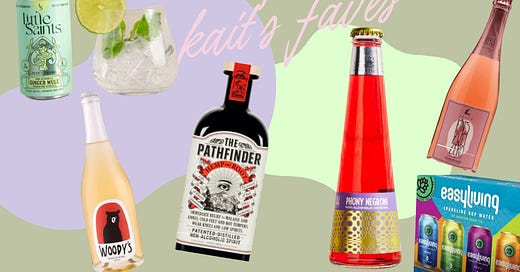Welcome to this tiny corner of the internet where an off-duty psychotherapist keeps the conversation going on how to make sense of this life thing we’re all doing. If you ever wondered what your therapist does off the clock—which, who among us hasn’t?—this is like that. Think of it as the adult equivalent of seeing your elementary school teacher at the grocery store picking out lemons. 🍋 Today’s little ditty is for those curious about Dry January. If that ain’t you, feel free to skip this one <3
One thing before we jump in, I show up very much as myself here. Myself first, and all my other labels are secondary. If a therapist speaking candidly feels like too much to your system, that is absolutely is OK and this may not be the best particular newsletter for you.
I’ve been sober since May 2023, but that is just one part of my story toward sobriety. Prior to making that life-altering choice, I made one zillion other decisions which included a few dances with going dry in January. Had I not had those longer stretches sans booze, including my perinatal experience, I wouldn’t have had faith that a sober life could be for me.
These stretches gave me a glimpse of what my body, mood, and energy levels would feel like over time without alcohol. I grew to understand and acclimate to the more natural rhythms of my body–boosts of aliveness and periods of stillness. Learning when I organically rise, when I have the most vitality during the day and when I’m ready for rest. I began to feel into my body more—what it is capable of and what it needs to recover. A relationship with myself deepening.
Whether you’ve wondered if you should cut alcohol out of your life permanently or you just need a break, Dry January could have it’s benefits for most people—better sleep, more energy, less anxiety, immune system support.1 That being said, BIG CAVEAT, it is NOT recommend for anyone considered a heavy drinker2 due to withdrawal symptoms that can be incredibly dangerous, even fatal. In those situations, consulting with a medical professional is the best first step in order to help move toward an alcohol-free life safely.
Reflection Points
What follows are some of the considerations I’ve compiled from my own experience of staying curious about my relationship with alcohol. Ways of going easy and staying attuned.
Stages of Change
First up is a framework around how change typically happens: The Transtheoretical Model (or as it’s more often known as, the Stages of Change model). I find this way of looking at things essential to keep in mind whenever any desired behavior change is on the table.
The stages *typically* go:
Keep reading with a 7-day free trial
Subscribe to dialoguing to keep reading this post and get 7 days of free access to the full post archives.





